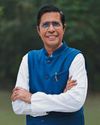
It was just another day in Beirut, on September 17 last year. As ordinary as days could be. The 5,000-year-old city has had a rough few decades caught in the conflicts of West Asia. But life goes on. Until it doesn't. Just as the clock struck 3:30 pm on that day, hundreds of pagers all around the city started beeping. And then exploded.
Chaos ensued. People threw their phones out in fear that those too would explode.
Twelve people died, including two children.
It later surfaced that the explosions were the result of an attack by Israel on operatives of Hezbollah. The attackers had hacked into the pagers and turned them into time bombs.
Two months later in Romania, elections had to be cancelled when a court found that voters had been manipulated using the short-video app TikTok, owned by the Chinese tech major ByteDance.
Halfway through the third decade of the 21st century, geopolitics has changed. As have the ways of geopolitical conflicts. The thaw in the world order that followed the Cold War has ended. And technology has transformed war. No longer does a nation need giant armies to annex territories or change regimes. Sophisticated chips and weaponised algorithms solve it all.
Meanwhile, the world is taking a protectionist turn. Advanced economies are becoming possessive about sharing critical tech. And just about three decades after the global order promised a future of shared prosperity through unhindered global trade, every nation is on its own.
In this new world, India finds itself incredibly vulnerable.
The most populous nation in the world generates reams of data every second. And much of this is stored in data centres in foreign lands. It uses a broad range of technology to improve its citizen services. And almost all of it is run on chips sourced from China. Its large technology industry either provides services or is involved only in assembly-level manufacturing.
This story is from the January 2025 edition of Outlook Business.
Start your 7-day Magzter GOLD free trial to access thousands of curated premium stories, and 9,000+ magazines and newspapers.
Already a subscriber ? Sign In
This story is from the January 2025 edition of Outlook Business.
Start your 7-day Magzter GOLD free trial to access thousands of curated premium stories, and 9,000+ magazines and newspapers.
Already a subscriber? Sign In

From Chandni Chowk to Global Recognition
For Manish Aggarwal, director at Bikano, Bikanervala Foods, the family business was not just a responsibility but a passion he took to the global stage

Spotting AI Scams
Al has become an integral part of our lives, from customer service no insurance claims. But it is also becoming a tool for fraudsters who use it to scam individuals and corporations

Let a Hundred Flowers Bloom
On the banks of the Ganges in industrial Kanpur, a start-up has blossomed that turns waste flowers into incense

BATTERY LOW
India produces enough green energy to power many of its largest cities yet lacks the storage to use it efficiently. A nation blazing forward must leap ahead in battery technology to stay on course

We Have Everything Going for Rajasthan
Rajyavardhan Singh Rathore, Rajasthan’s industry and commerce minister, tells Pushpita Dey why the state is suited to become a hub for investments.

Dairy and Other Dilemmas
India’s refusal to open its dairy market has complicated trade negotiations for years. As global partners demand concessions, is the cost of protectionism outweighing benefits?

Riding in a Maze
As gig workers ride into an uncertain future with little more than a smartphone and a bike, the government is struggling to arrange a socialsafety net. But millions without social security is recipe for disaster

BIRLA'S BIGGEST BATTLE
As Kumar Mangalam Birla completes 30 years at the helm of the Aditya Birla Group, he has a battle to defend his businesses and conquer new ones

THE INNOVATION LEAP
India dreams of becoming a product nation. But unless the corporate sector significantly increases spending on R&D, the country will continue to lag behind global peers

EDUCATION BUDGET MUST DOUBLE EVERY 3 YEARS
Veezhinathan Kamakoti, a renowned academic and director of Indian Institute of Technology Madras, tells Deepsekhar Choudhury on what technology sovereignty means for India and how it can propel the country towards its vision of becoming a developed nation by 2047.